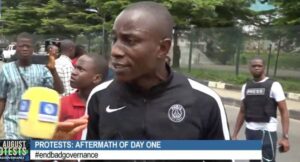In a heartwarming display of solidarity, Nigerians have come together to support Ogwu Chijioke, a father who joined the recent #EndBadGovernance protests in Lagos. Within just 24 hours, an online fundraising campaign collected N1.8 million to help Chijioke’s 13-year-old son pursue his dream of becoming a programmer.

The story began when Chijioke shared his struggles during an interview with Channels Television at the Lekki Toll Gate on August 1. Despite facing financial hardship, Chijioke expressed his determination to support his son’s ambitions, even if it meant personal sacrifice. “I’d rather die on the streets than see my son’s future wasted,” he said, highlighting the desperation many Nigerian parents feel in the face of economic challenges.
Chijioke’s daily commute from Mile 2 to Festac underscores the lengths many Nigerians go to make ends meet. His inability to afford essential resources like data and tuition fees for his son’s education resonated with many viewers who face similar difficulties.
The interview quickly spread across social media platforms, catching the attention of Morris Monye, a well-known influencer. Moved by Chijioke’s story, Monye launched a crowdfunding campaign with a goal of N1.8 million. The rapid response from fellow Nigerians was remarkable, with the target amount raised in less than a day.
This outpouring of support highlights several key aspects of Nigerian society:
1. Community spirit: Despite economic hardships, Nigerians continue to support one another in times of need. This collective action demonstrates the strength of community bonds that often fill gaps left by government services.
2. The power of social media: The viral spread of Chijioke’s story shows how social media can be a force for positive change, connecting those in need with those who can help.
3. Education as a priority: The enthusiasm to support a young aspiring programmer reflects the high value Nigerians place on education and technological skills as pathways to a better future.
4. The impact of economic struggles: Chijioke’s story is not unique. Many Nigerian families face similar challenges in providing quality education for their children, especially in specialized fields like programming.
5. Youth empowerment: By supporting the education of Chijioke’s son, contributors are investing in Nigeria’s future, recognizing the potential of young minds to drive progress and innovation.
The success of this fundraising effort also raises questions about sustainable solutions to Nigeria’s education challenges. While individual acts of generosity are commendable, they highlight the need for systemic changes to make quality education more accessible to all Nigerian youth.
The #EndBadGovernance protests, which formed the backdrop to this story, reflect widespread frustration with political and economic conditions in Nigeria. Citizens are demanding better governance, improved public services, and more opportunities for the younger generation.
As Chijioke’s son now has the opportunity to pursue his programming studies, his story becomes a symbol of hope and resilience. It shows that even in challenging times, the spirit of community and the desire for a better future can lead to positive outcomes.
However, the broader issues remain. While this crowdfunding success is cause for celebration, it also serves as a reminder of the work still needed to create a Nigeria where all children have access to the resources they need to pursue their dreams.
As the country continues to grapple with governance and economic challenges, stories like Chijioke’s highlight both the difficulties faced by ordinary Nigerians and the extraordinary capacity for compassion and collective action within the community. It’s a testament to the resilience and unity of the Nigerian people, even in the face of adversity.




